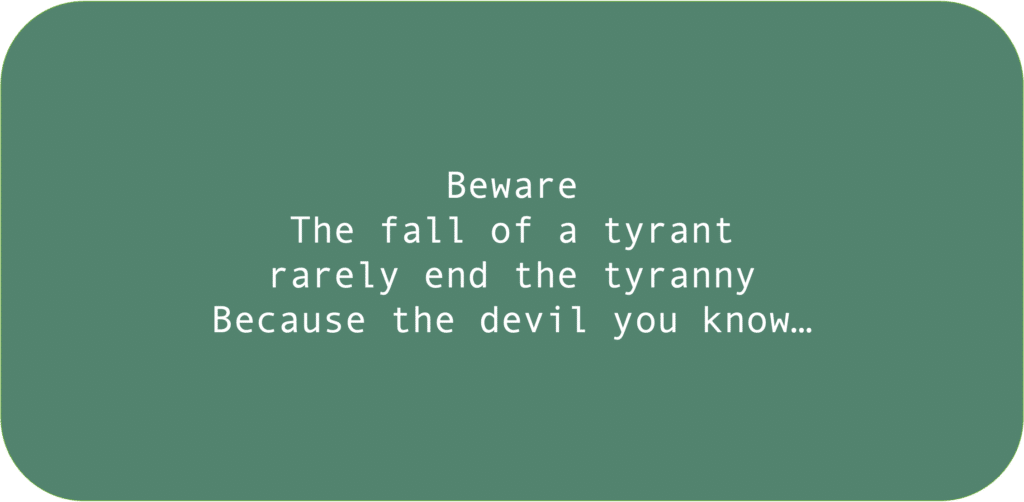
Assad dynasty ends with a whimper
The House of Assad has fallen. Its 54-year reign of terror ended in humiliation this weekend, with Bashar al-Assad fleeing as HTS rebels stormed Damascus. Assad’s father, Hafez, was infamous for genocidal repression, most notably in Hama, where a 1982 uprising ended with tens of thousands dead. Bashar inherited not only the throne but also his father’s penchant for brutality.
Bashar proved this in 2011 when the Arab Spring erupted. He defied the revolutionary tide with a chilling innovation: using chemical weapons on his own people. His survival was secured, however, by his superpower patron, Russian President Vladimir Putin. Putin, equally brutal and depraved, propped up Bashar’s regime and weaponized Russian support to counter America’s influence in the region.
This superpower contention peaked when Bashar brazenly crossed US President Barack Obama’s “red line” by gassing civilians. Obama famously declared, “Assad must go.” But his failure to back up those words with action emboldened Assad and cemented Putin’s image as the autocrat’s autocrat — a strongman willing to counter America’s empty threats.
Russia and Iran: Betraying proxies
Today, the once-indomitable Assad finds himself abandoned. Russia’s foreign ministry confirmed his departure but quickly distanced itself from any talks surrounding his ouster. This betrayal ironically mirrors the humiliating US and NATO withdrawal from Afghanistan, highlighting the fickle nature of patronage in geopolitics.
Russia invaded Ukraine nearly three years ago, expecting to absorb it into its neo-Stalinist vortex within days. Instead, it remains bogged down in a humiliating quagmire. Now Syria has fallen faster than the three days Russia thought it needed to take Ukraine, compounding Putin’s humiliation.
Putin mocked US presidents as weak and unreliable, insinuating that they’d abandon an ally at the first sign of national unrest. He scoffed that Obama did just that when he called on Mubarak to resign during the Arab Spring. Yet Putin is now emulating Obama with Assad in Syria, and his reputation as a strong and reliable ally lies in tatters.
It’s also notable that Iran played the same proxy role for Russia in Syria that Hamas did for Iran in Gaza and Hezbollah in Lebanon. Because Israeli strongman Benjamin Netanyahu has so decimated Iran’s proxies — even bombing Iran itself into submission — that, like Russia, it was powerless to defend Bashar.

Erdogan: The Region’s New Kingmaker
Amid the chaos, Turkish President Recep Tayyip Erdogan has emerged as Syria’s de facto power broker. His patronage of the HTS rebels who deposed Assad marks a dramatic shift in regional power dynamics.
Frankly, he now wields more influence in Syria than Iran’s Ayatollah — a reality that would have been unthinkable a decade ago. Erdogan’s goals are clear: oversee the return of Syrian refugees from Turkey, shape the composition of Syria’s new government, and manage the role of Kurdish factions, whose aspirations often clash with Ankara’s interests.
However, his ambitions are rife with risks. After all, the combustible tensions among Syria’s competing factions could easily ignite prolonged civil conflict, aping the deadly chaos that followed the fall of Saddam Hussein in Iraq in 2003, of Muammar Gaddafi in Libya in 2011, or of Omar al-Bashir in Sudan in 2019.
Syria, another Afghanistan?
Syria is now every bit the blight on Russia’s foreign legacy that Afghanistan is on America’s — a quagmire of ambition turned humiliation. Russia’s only saving grace is holding onto its military base in Syria. If it does, that would stand in consoling contrast to the cowardly way the US abandoned its military base in Afghanistan in the middle of the night.
The fall of the House of Assad marks a fateful end for Bashar but offers a hopeful beginning for the HTS rebels. Will they honor their promises of democratic rule, or will they follow the Taliban’s bait-and-switch deception?
If they choose the former, even skeptical Western powers will likely lift sanctions and grant the rebels the legitimacy they crave. HTS is now on the global stage, and the world is watching. Every democratic nation would relish seeing a democratic Syria deliver a blow to Russia’s axis of autocracies — all while eyeing similar comeuppance for Moscow’s tinpot dictators in Africa. Hope springs eternal.